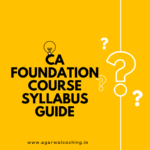
Introduction
Becoming a Chartered Accountant (CA) is a coveted dream for aspiring finance professionals, offering a pathway to a rewarding and respected career. However, before embarking on this journey, it is essential to understand the eligibility criteria for CA course registration. In this blog, we will delve into the requirements that aspiring candidates must meet to enroll in the CA course and set themselves on the path to financial excellence.
1. Educational Qualifications
The first and foremost eligibility criterion for CA course registration is the candidate’s educational qualifications. Typically, candidates must have completed their high school education (10+2 level) or its equivalent from a recognized educational board. Student should have 50% in 10+2 level . This educational foundation forms the basis for pursuing the CA course and ensures that candidates have a strong grasp of fundamental concepts before delving into the complexities of accounting and finance.
2. Age Limit
While the educational qualifications are the primary criteria, there may also be an age limit imposed by the accounting body or institute offering the CA course. The age limit is usually set to ensure that candidates have ample time to complete the course and gain the necessary practical experience before attaining the CA designation. The specific age limit may vary from country to country or depending on the respective accounting body’s regulations.
3. Registration with the Accounting Body
Once candidates meet the educational and age requirements, the next step is to register with the relevant accounting body responsible for conducting the CA course. In most cases, aspiring CAs must register with the Institute of Chartered Accountants (ICAI) or a similar professional accounting institute in their country. The registration process typically involves submitting necessary documents, paying the registration fees, and adhering to the prescribed timelines.
4. Entry Level: CA Foundation Course
After successful registration, candidates gain entry into the CA Foundation course—the first level of the CA qualification. The CA Foundation course introduces candidates to the fundamentals of accounting, economics, business mathematics, and mercantile law. It is designed to lay a strong foundation for the aspiring CAs, equipping them with the necessary knowledge and skills required for the Intermediate and Final levels of the course.
5. Articleship Training Eligibility
While not a prerequisite for CA course registration, aspiring CAs should be aware of the eligibility criteria for articleship training—the practical training required to become a Chartered Accountant. In most cases, candidates become eligible for articleship after clearing the CA Foundation exam and CA Intermediate Exam . However, specific regulations regarding the commencement of articleship training may vary between countries or accounting bodies.
Conclusion
Becoming a Chartered Accountant is a journey that demands dedication, hard work, and a strong educational foundation. Understanding the eligibility criteria for CA course registration is the first step towards embarking on this path of financial expertise and professional excellence. Aspiring candidates should ensure they meet the educational qualifications, adhere to any age limits, and register with the relevant accounting body to begin their CA journey. By taking these crucial steps, they pave the way for a rewarding and successful career as a Chartered Accountant, offering a world of opportunities in finance, auditing, taxation, and beyond.








